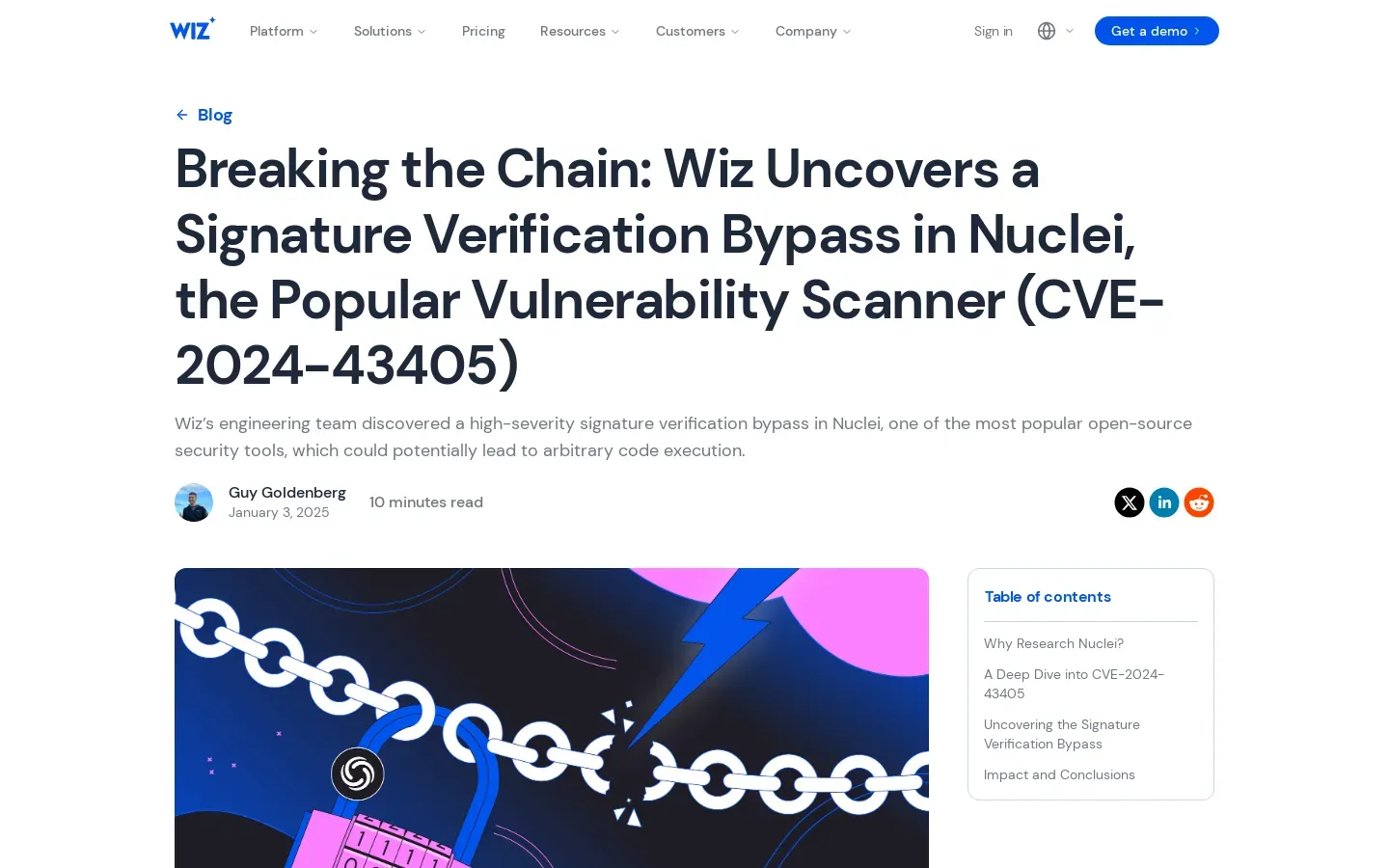
Wiz Identifies Vulnerability in Nuclei Vulnerability Scanner
/ 4 min read
Quick take - Recent research has identified critical vulnerabilities in the open-source security tool Nuclei, particularly in its signature verification mechanism, highlighting the need for improved parser consistency and community awareness to enhance overall cybersecurity.
Fast Facts
- Recent research identified critical vulnerabilities in Nuclei, an open-source security tool, focusing on its signature verification mechanism.
- Key findings include the designation of vulnerabilities as CVE-2024-43405, highlighting the need for parser consistency to ensure effective threat detection.
- The study advocates for enhanced template validation frameworks and recommends running Nuclei in isolated environments with patched versions to mitigate risks.
- Emphasizes the importance of collaboration and responsible disclosure within the cybersecurity community to improve the integrity of security tools.
- Future directions include developing a certification program for security professionals to promote secure practices and enhance community awareness in cybersecurity.
In the fast-paced world of cybersecurity, where threats are evolving at an unprecedented rate, the tools we rely on to protect our digital assets must remain resilient and reliable. One such tool, Nuclei, has gained popularity as an open-source security scanner that utilizes a YAML-based template system for automated threat detection and response. Yet, recent research has unveiled vulnerabilities within its signature verification mechanism, specifically identified as CVE-2024-43405. This revelation raises critical questions about the integrity of widely-used security tools and emphasizes the need for rigorous validation frameworks.
As researchers delved into Nuclei’s codebase, they uncovered significant parsing inconsistencies that could potentially compromise its effectiveness. The importance of robust verification mechanisms cannot be understated; without them, security practitioners risk implementing flawed scans that might overlook critical threats. The study’s findings advocate for a systematic approach to enhanced template validation, ensuring that each template adheres to stringent security standards before being deployed in real-world scenarios. By bolstering this aspect of Nuclei, developers can mitigate the risks associated with vulnerabilities.
Collaboration within the cybersecurity community is paramount. The research underscores the necessity of responsible disclosure, where security vulnerabilities are communicated transparently to maintain trust between tool developers and users. This collaborative spirit not only enhances the overall security ecosystem but also encourages a culture of accountability among those creating and using open-source tools. As part of this initiative, it’s crucial to foster community education and awareness programs aimed at improving understanding of safe practices when utilizing these tools. Such programs could significantly reduce the chances of exploitation by empowering users with knowledge.
The findings also point towards a future direction that includes developing a certification program for security professionals focused on secure practices with open-source tools. This proactive measure would cultivate an environment where security awareness is prioritized, thereby strengthening defenses against potential exploits. With the rise of sophisticated cyber threats, having certified professionals who are well-versed in best practices for tool usage is essential for maintaining a robust cybersecurity posture.
While the research highlights several strengths, it also reveals limitations that warrant further investigation. For instance, while automated threat detection is a powerful feature of Nuclei, it relies heavily on the accuracy of its templates and signature extraction methods—issues sparked by inconsistencies in how parsing functions operate within the tool. Addressing these weaknesses will require ongoing scrutiny and refinement to ensure the tool remains effective against emerging threats.
Practical recommendations have emerged from this analysis: users should consider running Nuclei in isolated environments to minimize exposure to potential vulnerabilities until patches are applied. Ensuring that only updated versions are utilized can dramatically lower risks associated with known exploits. Additionally, employing regex for signature extraction can streamline processes and enhance reliability when identifying threats.
As we look ahead, the implications of these findings extend beyond Nuclei itself; they prompt broader conversations around the responsibility shared by developers and users alike in safeguarding cybersecurity landscapes. The growing reliance on open-source tools necessitates vigilance and proactive measures to enhance their security integrity. With continued investment in education, collaboration, and robust verification mechanisms, the cybersecurity community can work together to navigate an increasingly complex threat landscape while fostering a culture of security consciousness that benefits everyone involved.



